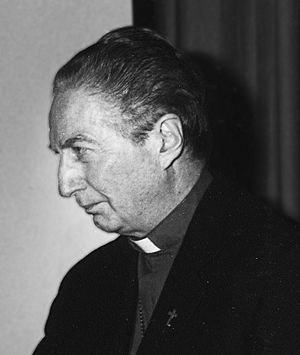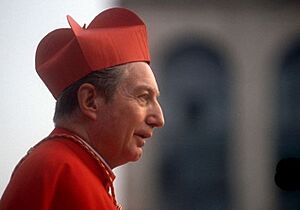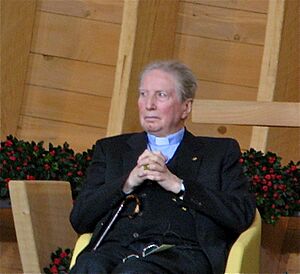Carlo Maria Martini facts for kids
Quick facts for kids His Eminence Carlo Maria Martini S.J. |
|
|---|---|
| Cardinal, Archbishop Emeritus of Milan |
|

Martini in 1992
|
|
| Church | Roman Catholic Church |
| Archdiocese | Milan |
| See | Milan |
| Appointed | 29 December 1979 |
| Enthroned | 10 February 1980 |
| Reign ended | 11 July 2004 |
| Predecessor | Giovanni Colombo |
| Successor | Dionigi Tettamanzi |
| Other posts | Cardinal-Priest of Santa Cecilia in Trastevere (1983–2012) |
| Orders | |
| Ordination | 13 July 1952 |
| Consecration | 6 January 1980 by Pope John Paul II |
| Created Cardinal | 2 February 1983 |
| Rank | Cardinal-Priest |
| Personal details | |
| Birth name | Carlo Maria Martini |
| Born | 15 February 1927 Orbassano, Kingdom of Italy |
| Died | 31 August 2012 (aged 85) Gallarate, Italy |
| Buried | Cathedral of Milan, Italy |
| Nationality | Italian |
| Parents | Leonardo Martini Olga Maggia |
| Previous post |
|
| Alma mater |
|
| Motto | Pro veritate adversa diligere ("For the love of truth, dare to choose adverse situations") |
| Signature | |
| Coat of arms |  |
Carlo Maria Martini (1927 – 2012) was an important Italian Jesuit priest. He became a cardinal in the Catholic Church and was known as a Biblical scholar. From 1980 to 2004, he served as the Archbishop of Milan. He was made a cardinal in 1983.
Martini was a very smart and respected figure in the Catholic Church. He was seen as a more open-minded candidate for Pope in 2005. This was after Pope John Paul II passed away. Some sources said he received many votes in the first round of the election. However, Pope Benedict XVI was eventually chosen as Pope.
Martini joined the Society of Jesus (Jesuits) in 1944. He became a priest in 1952. It was unusual for a Jesuit to be named a bishop, but he became Archbishop of Milan. He was considered to have more modern views within the Church. Martini suffered from a rare form of Parkinson's disease. He retired as archbishop in 2004 and moved to Jerusalem. He passed away in 2012 near Milan.
After his death, an Italian newspaper published his last interview. In it, he said the Church needed to update itself.
Contents
Early Life and Education
Carlo Maria Martini was born on February 15, 1927. His hometown was Orbassano, Italy. His father, Leonardo, was an engineer. His mother was Olga Martini. He was baptized a week after his birth.
He went to a school in Turin run by Jesuits. On September 25, 1944, he joined the Society of Jesus. He became a priest on July 13, 1952. Martini studied philosophy and theology in Italy.
In 1958, he earned a doctorate in theology from the Pontifical Gregorian University. His studies focused on the Resurrection stories in the Bible. Later, he earned another doctorate in Sacred Scripture. This was from the Pontifical Biblical Institute. He graduated with the highest honors.
Academic Career and Leadership
After his studies, Martini quickly became a successful scholar. In 1962, he became a professor at the Pontifical Biblical Institute. He taught about how ancient texts were written. In 1969, he became the rector (head) of the Institute. During these years, he edited many important scholarly works.
Martini published many books and articles. He was the only Catholic member of a special committee. This group prepared a new Greek version of the New Testament. In 1978, he became the rector of the Pontifical Gregorian University. He stayed in this role until he was appointed a bishop.
Becoming a Bishop and Cardinal
On December 29, 1979, Pope John Paul II chose Martini to be the Archbishop of Milan. Martini became a bishop on January 6, 1980. Pope John Paul II performed the ceremony.
On February 2, 1983, he was made a Cardinal-Priest. His chosen motto was "For the love of truth, dare to choose adverse situations." This means he believed in seeking truth, even if it was difficult.
Martini led an important meeting of bishops in 1983. He also served as President of the European Bishops' Conference from 1987 to 1993.
In 1987, he started a special series of public talks. It was called the "cathedra of non-believers." He invited scientists and thinkers who didn't believe in God. They discussed important topics like science, society, and faith.
Martini received many honors for his work. In 1996, he got an honorary doctorate from Russia. In 2000, he won an award in Spain for social sciences. He also became a member of the Pontifical Academy of Sciences.
Martini was part of a group of church leaders. They met to discuss how the Church could improve. They hoped for a new Pope who would bring more reforms.
In 2004, Martini reached the age when bishops usually retire. He was replaced as Archbishop of Milan. In 2005, he was 78 years old. This meant he could vote for the new Pope. Many people hoped he would become Pope. However, his health was not good, and he was known for his modern views.
After retiring, Martini moved to Jerusalem. He continued his work as a Bible scholar. He returned to Milan in 2008 and lived in a Jesuit house.
Death and Funeral
Martini passed away on August 31, 2012, in Gallarate, Italy. Pope Benedict XVI sent a message of sympathy. He praised Martini's strength during his illness. He also thanked him for his long service and scholarly work. The Mayor of Milan said Martini "illuminated the way for the entire city."
More than 150,000 people came to see Martini's casket. His funeral Mass was held on September 3 in the Milan Cathedral. Many cardinals and religious leaders attended. The Prime Minister of Italy was also there. Martini was buried in a tomb inside the Milan Cathedral.
Martini's Views
Martini was often seen as one of the more open-minded cardinals. His writings and ideas gained a lot of attention. Sometimes his views were debated, which led to media coverage. In his last interview, he suggested the Catholic Church needed big changes. He said it was "200 years out of date."
Martini was considered "progressive" on many topics. These included human relationships and the role of women in the Church.
Church Teachings
In 2000, Martini commented on a Church document. He found it "theologically rather dense." He believed it was not easy for people to understand.
End-of-Life Care
Martini spoke about the right to refuse medical treatments. He said that very sick patients should be able to refuse treatments. He also felt doctors who help them should be protected by law. Catholic teaching allows refusing "extraordinary" treatments. Martini himself refused medical treatment as his illness got worse.
Teamwork in the Church
Martini wanted more teamwork among bishops in leading the Church. He encouraged continued discussion on how the Church is governed.
Role of Women
Martini wanted more study on the role of women in the Church. He supported the idea of women becoming deacons.
Social Work
He strongly supported helping people in need. He often called for more action to assist those who are struggling. Martini hoped the Church could inspire people's hearts today.
Catholic Schools
Martini was a strong supporter of Catholic schools. He often spoke about the need for government help for these schools. He also thought that more time should be spent teaching Catholic religion in Italian high schools.
Homosexuality
In a book published before his death, Martini shared his thoughts on marriage. He stated that a same-sex couple cannot be fully compared to a marriage. However, he also said he could understand why some people support gay pride events. He saw them as a way for people to affirm who they are.
See also
 In Spanish: Carlo Maria Martini para niños
In Spanish: Carlo Maria Martini para niños
 | Kyle Baker |
 | Joseph Yoakum |
 | Laura Wheeler Waring |
 | Henry Ossawa Tanner |



